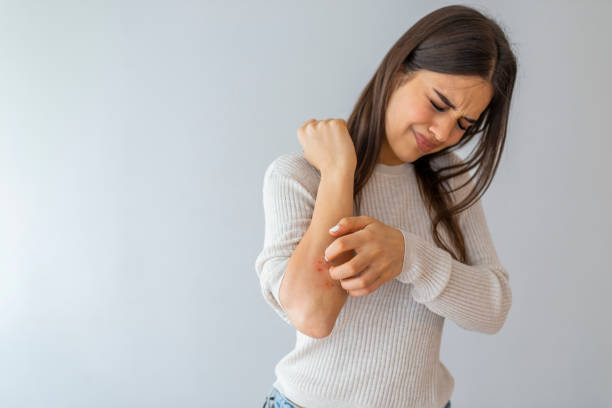Psoriasis
Psoriasis
Psoriasis is a skin disorder that causes red, itchy, scaly patches on your knees, elbows, trunk, and scalp. Psoriasis is common but a chronic disease with no permanent cure. It forms bumpy and red patches covered with white scales. Psoriasis can grow anywhere in your body but commonly appear on your scalp, elbows, and lower back. It tends to go through cycles, flaring for a few weeks or months. This condition causes your skin tissue to multiply up to 10 times faster than normal. But psoriasis is not a contagious disease. Sometimes it runs within the family members.
Psoriasis usually occurs in early adulthood. In most cases, it affects only a few areas. But in severe conditions, it covers a large part of the body. The patches can go and come back throughout a person's life.
Symptoms
The symptoms can vary from person to person, depending upon which type of psoriasis you have. The common signs and symptoms of psoriasis include:
- Red patches are covered with thick, white scales.
- Small scaly spots, commonly seen in children.
- Dry and cracked skin with maybe bleed or itch.
- Itching, burning, or soreness
- Thickened, pitted, or ridged nails
- Swollen and stiff joints
Psoriasis patches may range from a few spots of dandruff-like scaling to big eruptions that cover large areas. The most affected areas of the body are the lower back, elbows, knees, legs, soles of the feet, scalp, face, and palms.
Most forms of psoriasis go through cycles, flaring for a few weeks or months, then disappearing for a time or even going into remission.
Causes
Psoriasis is an autoimmune disease, and it happens when your immune system attacks its own healthy skin tissues or cells of the body. But the exact cause of psoriasis is still unknown. According to researchers, the immune system, environment, and genetics can play major roles in its progression. The common psoriasis triggers include:
- Infections, such as strep throat or skin infections.
- Weather, especially cold, dry conditions.
- Injury to the skin, such as a cut or scrape, a bug bite, or a severe sunburn.
- Stress.
- Smoking and exposure to secondhand smoke.
- Heavy alcohol consumption.
- Certain medications — including lithium, high blood pressure medications, and antimalarial drugs.
- Rapid withdrawal of oral or systemic corticosteroids.
Types
There are many kinds of psoriasis, including:
- Plaque psoriasis
- Nail psoriasis
- Guttate psoriasis
- Inverse psoriasis
- Pustular psoriasis
- Erythrodermic psoriasis
- Psoriatic arthritis
Risk Factors
Anyone can have psoriasis. But these factors can increase the risk of developing psoriasis:
- Family History - Family history can contribute to this condition. If one parent with psoriasis increases your risk of getting the disease, and having two parents with psoriasis increases your risk even more.
- Stress. Stress may affect your immune system, high stress levels can increase your risk of psoriasis.
- Smoking. Smoking tobacco not just increases your risk of psoriasis but also can increase the severity of the disease. Smoking may also play a role in the initial development of the disease.
Complications
People with psoriasis are at higher risk of developing other conditions, including:
- Psoriatic arthritis, which causes pain, stiffness, and swelling in and around the joints
- Eye conditions, like conjunctivitis, blepharitis, and uveitis
- Obesity
- Type 2 diabetes
- High blood pressure
- Cardiovascular disease
- Other autoimmune diseases, such as celiac disease, sclerosis, and the inflammatory bowel disease called Crohn's disease
- Mental health disorders, such as low self-esteem and depression.
When to see a doctor
If you suspect you have had psoriasis, consult your doctor. Also, talk to your doctor if your psoriasis:
- Having severe or widespread
- Causes you discomfort and pain
- Causes you concern about the appearance of your skin
- Causes joint problems, such as pain, swelling, or inability to perform daily tasks
- Doesn't improve with treatment
Topics
Jammu & Kashmir - History, Culture & Traditions | J&K Current Trends | Social Network | Health | Lifestyle | Human Resources | Analytics | Cosmetics | Cosmetology | Forms | Jobs
Related blogs
Natural Remedies For Oily Skin
Oily skin or acne may be challenging, still, home...Simple and Amazing Home Remedies for White skin
A disciplined approach to skincare can provide...Acne Scars and Its Home Remedies
Acne is not itself only a problem, it also leaves...Best Ways to Unclog Pores and Methods to Prevent
Pores are the small opening on the skin that...
Quote of the Day
"Time Flies Over, but Leaves its Shadows Behind"

